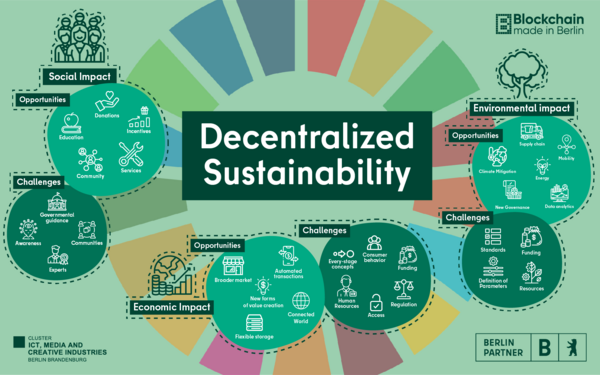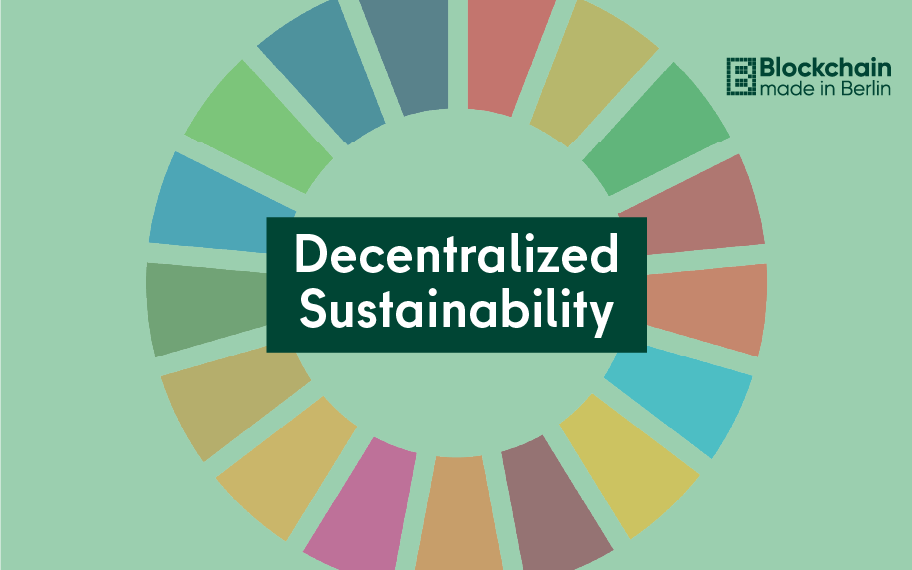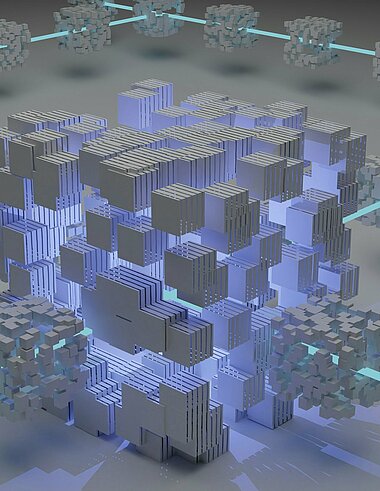Over the last years, the question of Blockchain’s impact on economy and society has become more and more important. Next to the criticism of the vast energy consumption there has also been developments to foster positive impacts of decentralized technologies in different sectors and industries. These developments aim to establish blockchain and web3 applications as enabler for a sustainable development. A rising number of initiatives provide incentives for greener manufacturing, improved supply chain management, and to raise efficiency of processes.
Against that background, Berlin Partner, represented by the Cluster ICT, and BerChain hosted the event Decentralized Sustainability in collaboration with the Dutch Blockchain Coalition and The Embassy of the Netherlands in Berlin on December 1, 2022 at the Impact Hub Berlin. To give you a glimpse on how synergies can be used for good, and society and economy can be transformed regarding supply chains, mobility, the use of resources and energy, let's dive into what to know about the role for blockchain & web3 as potential enablers for a greener future.
From DeFi to ReFi - The Positive Impact of Blockchain
Clearly, blockchain based services have the potential to be an enabler for a more sustainable future, regarding blockchain technologies themselves as well as specific use cases or in local communities. Positive impact initiatives, whether regarding supply chain transparency and tracking, community currencies, secure digital identities, land registries, or agriculture, are still quite new, but already very important to shape a sustainable future.
While blockchain applications which use crypto and tokens for donations, philanthropy, education, or community currencies are successfully established and applied already, only one third of above-mentioned new business ideas will make it to a matured stage of founding. This is caused by profound adaption challenges as well as their interoperability, user experience, lack of experts and developers, access to capital, time to scale and mostly high energy consumption. Nevertheless, the movement to transform DeFi (Decentralized Finance) to ReFi (Regenerative Finance) can be observed by numerous companies and collectives, for example the Celo Climate Collective. Its mission is to build a trusted market for high-quality, digital environmental assets.
ReFi aims to apply regenerative principals where the market is failing in coordination. And indeed, the market for projects in blockchain for good is in its infancy. All projects within the ReFi ecosystem work connected to each other and are built with interoperability protocols and clear governance to benefit each other. It is a catalyst of what web3 and sustainability can potentially be and mean together. Additionally mentioned by Lucas Zaehringer, founder of Positive Blockchain.io: “As solutions evolve we need to address that it is not only about sustainability, but also about various economic concepts.“
There are already good examples of projects such as the UNICEF Innovation Fund for Blockchain Startups that is investing in new business ideas to support the fields of education, impactful crypto donations for non-profit organizations, developing sustainable and efficient ideas, and to empower the blockchain community and their access for people. Let's have a closer look on one of these new approaches in terms of sustainability and green(er) power to begin with.

The Decentralized Future of Energy and Mobility
With rising shares (est. increase of 80% by the year 2030) and availability of renewable energies, regions may facing the challenge of an irregular energy supply due to the inconsistent sources and storage possibilities of them, e.g., wind or solar energy. This causes more fluctuation and therefore instability in our electricity map. To face these effects, more efficient energy storages and access need to be found.
BloXmove offers solutions for the mobility sector, not only for identification, verification and documentation of green energy sources, documentation of energy flows, and of course enabling the direct connection between devices, they also aim to encourage prosumers as well as companies to exchange and automate transactions.
Dayon Elings, Specialist Business Development & Energy Account Manager at bloXmove presented their showcase of a web3 solution provider. The vision was to create a worldwide decentralized and collaborative mobility alliance by connecting green power and electric mobility to commercialize the decentralized energy grid of the future located on a the transaction level. The concept was originally incubated at Daimler Mobility Blockchain Factory (now Mercedes Benz Group) with the help of Spherity (a German blockchain company), Riddle&Code (a product-led service company for web3 applications), and 51nodes (supports digital and disruptive innovations with Open-Source-Blockchain technology). In 2021, Daimler Mobility AG successfully assigned this new software license and bloXmove was able to further develop their open mobility blockchain platform. Taking a look ahead to 2030, the potential market through flexible storage services could potentially increase to 21 billion EUR by then. With that in mind, they develop other pilot projects and applications to improve and challenge green energies in the mobility sector. Find out more about all bloXmove projects here: https://bloxmove.com/
The challenges of fostering a greener energy supply remain strong. There are several ways to incentivize and engage companies’ and peoples’ behaviours. To find a long-term solution to improve and become more energy efficient, EnergieKnip (BlockchainLab Drenthe) was invented. The app collects consumer behaviour of locals and raises awareness by purpose-bound money (“digital coins”) for energy saving measures. The anonymous collected data can be used to create and evaluate relevant heatmaps and can be shared for future campaigns and improvements. App users can earn points by answering predefined questions and redeem these points at local hardware stores. Residents-, municipalities, local retailers, and the environment can benefit from this project, which is the largest public service governmental blockchain project in the Netherlands today and is applicable to many other goals, such as in tourism, health, or public transportation.
Find more information here: https://energieknip.nl/
A Look into the Future
With lots of initiatives and projects that already exist and are applied in various fields to transform towards a greener future in a connected, decentralized manner, let's have a closer look into supply chain management. The goal is to create standards and solutions with the help from governmental institutions and capable experts to create an even better and more sustainable ecosystem in the near future of blockchain.
Simone Andrae, CEO & Founder of betterECO, still sees space for improvement when it comes to building bridges to and matchmaking companies on a cross-continental level.
“We definitely need resources, because we have a huge demand on all sides and we cannot cope with the demand, especially human resources and of course money.”
Another aspect when thinking ahead is the validation of blockchain technologies and products regarding their sustainability. The parameters for a product's impact and their definition of sustainability are challenging to be defined.
“We need a unique definition on sustainability and have a closer look into the technologies that really measure and judge the results. This is a long journey we still have to go, but we are on the way”, so Andrae.
Not only to align these definitions and parameters are relevant for the ecosystem: When deciding to apply Blockchain in their own business cases, company owners should carefully evaluate whether the implication of blockchain to their business model is applicable and can benefit to a more sustainable way of working.
When aiming for this overall goal, it is also necessary to support and collaborate in the ways companies are working together and to find symbiosis to benefit from each other. Only by that we will be able keep up the pace of innovation that was shown by the industry within the last couple of years.
Having a look on the key takeaways of the event, we can determine a lot of great initiatives that contribute to fields of mobility, energy, data analytic or supply chain, in a sustainable matter. The challenge of this goal is to focus on the required actions between the private sector, tech parties and governmental parties. Only when emphasizing the role of our government, the level of available experts and the access to necessary financial support, we will be able to decentralize, standardize and pave the ways of working with blockchain applications to contribute to a more sustainable future. Once this can be applied, it sure will be a successful tool to benefit business models for good and furthermore our local communities.
Find a detailed review of all panels and talks of the Decentralized Sustainability event on YouTube.
Sources:
- https://berchain.com/
- https://www.digital-bb.de/
- Impact Hub Berlin
- Dutch Blockchain Coalition
- Decentralized Sustainability Event
- https://positiveblockchain.io/
- Celo Climate Collective
- UNICEF Innovation Fund for Blockchain Startups
- BloXmove
- Spherity
- 51nodes
- energy web
- ONTology
- EnergieKnip
- BlockchainLab Drenthe
- betterECO




